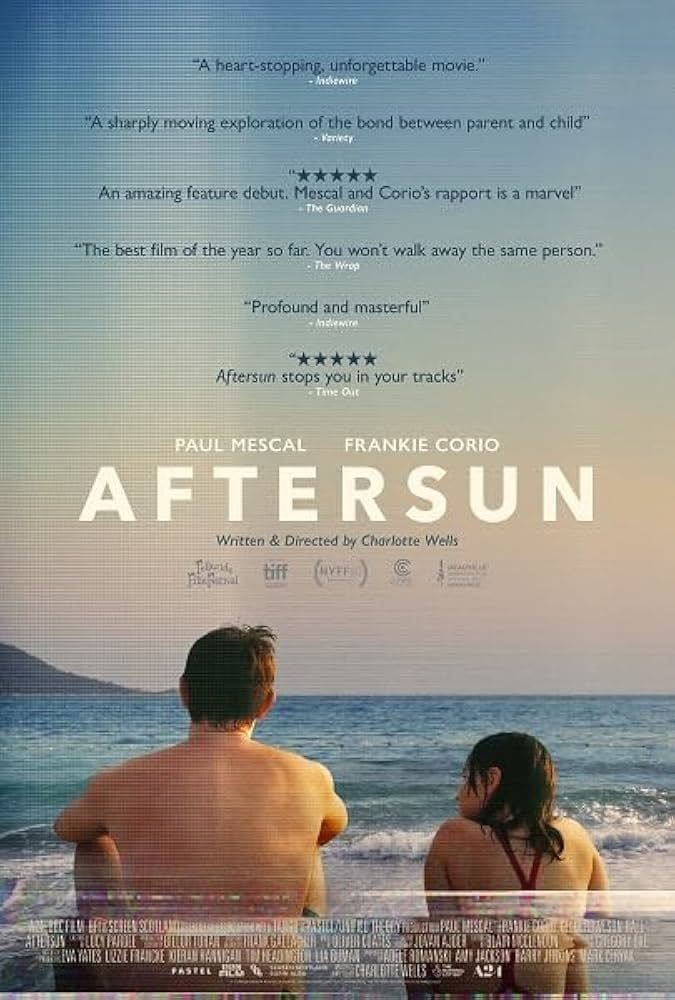TONIGHT’S FILM.
CHARLOTTE WELLS’ "AFTERSUN".
It’s a coming-of-age drama. You can watch it on Max.
WELCOME BACK TO TUESDAY NIGHT.

New to tnmn? Here’s how you do it.
▶ If you prefer recommendations without commentary. Don’t scroll. You have the power to choose.
▶ If you don’t like this week’s movie. Scroll to our weekly community-sourced recommendations, just below this section. Or, log in and visit the tnmn archives.
▶ If you love ❤️ tnmn. Share the link to your friends: http://www.tuesdaynightmovienight.com/subscribe. If they don’t sign up, pretend you got a new phone and don’t have their number next time they text you.1
CHARLOTTE WELLS’ “AFTERSUN”
WHAT IT IS.
A spoiler-free description of the movie.
Sophie reflects on quality time spent with her father at a cheap resort in Turkey.
IF YOU LIKE.
If you like these things, then you’ll like the film.
▶ Melancholy. There’s an overcast of sadness through the film. Of something long lost. Joy breaks through, but sparsely.
▶ Emotionally intelligent kids. It’s not a coming-of-age story without a scene or two where the teenager surprises the parent with their emotional acuity.
▶ Portrait films. Like, visual storytelling. The sort that doesn’t concern itself with progressing a plot. Rather, it meditates on an identity or relationship. If you’re the kind of person who reaches for your phone when characters aren’t talking — this one isn’t for you.
MY TAKE.
What I liked about it.
Writer-director Charlotte Wells’ feature debut, “Aftersun”, debuted at Cannes in 2022 to critical acclaim, in part due to the nuanced performances delivered by co-stars Paul Mescal and newcomer Frankie Corio. The father-daughter chemistry on display in “Aftersun” is remarkable.
Mescal’s performance as Calum, Sophie’s young father who’s set out to take her on a fun vacation, is earthy, restrained. He provides a portrait of a man who is at once a wonderful father, and a supremely flawed individual like the rest of us.
Corio’s performance as Sophie so eloquently captures a kind of introspection many of us might recall from our formative years. The time in our lives when we aren’t quite sure who we are. The time when we realize our parents aren’t perfect; they don’t have all the answers. When we discover an urge to care for our parents as much as they care for us. It’s a layered performance; one you don’t often see from a first-time actor.
Paired with these performances is writer-director Charlotte Wells’ excellent use of perspective in the film. Wells deftly makes it clear from the outset that the film is meant to be an imperfect reflection of the past. A woman’s recollection of a vacation she once took with her father. And so, much of the film unfolds from Sophie’s perspective, in a richly saturated color palette reminiscent of an old photograph.
She also makes great use of her set, eliminating the need for exposition by allowing the surroundings to do the talking. Calum’s books sloppily adorning the hotel cabinetry, for example, suggest a man who’s had emotional struggles.
Wells’ camera work is often off-center. Lost, disoriented. Lingering on her father’s reflection in an old hotel TV set. Unable to enter a closed door with him on the other side. For the few times when Sophie is off-screen, the story almost plays like what she imagines her father was doing.
This visual, grounded storytelling is what makes “Aftersun” a film that stays with you. It’s such a compelling representation of how we remember, how we love.
Yes, time will pass. Details will blur. The film you once knew well will fade into something resembling a watercolor painting left to bake out in the sun. But much like Sophie, you will carry the emotional weight of it all for quite some time.
Enjoy the film.
OH, NEAT.
A fact or two about the production that makes you say “oh, neat”.
▶ Paul Mescal and Frankie Corio were given two weeks at the resort together prior to shooting the film. This “rehearsal” time was unscripted, to enable them to build a more authentic, trusting relationship before they’d play father and daughter in the film. They played pool, ate gelato, and relaxed at the resort together.2
▶ The film has a notably saturated color palette, reminiscent of older photographs from the 90’s. To achieve the look, cinematographer Gregory Oke and Wells collected a series of photos from family albums. They worked with their colorist, Kath Raisch, to match the aesthetic in the edit. 3
THE QUOTE.
One great line of dialogue from the film.
I Think It's Nice That We Share The Same Sky.
See you next week!
Blake

1 I’m kidding. This could hurt their feelings and make them feel like you don’t value their friendship.

